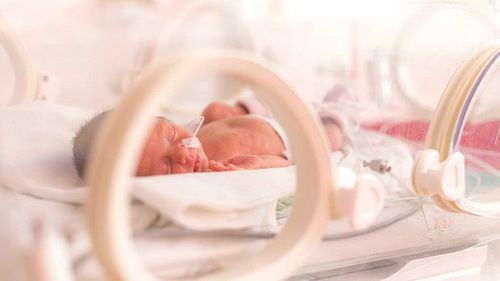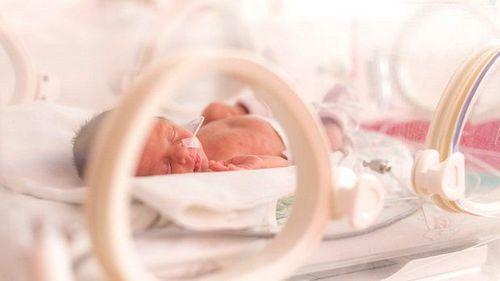This is an automatically translated article.
The article was professionally consulted by Specialist Doctor I Bui Thi Ha - Pediatrician - Neonatologist - Department of Pediatrics - Neonatology - Vinmec Ha Long International General Hospital.Neonatal respiratory distress is most common in preterm infants. The reason is that the lungs of children are immature, the alveolar surface area for gas exchange is not enough, causing respiratory failure. If not detected and treated promptly, it can lead to death in children.
1. Causes of respiratory failure in infants
The main cause of respiratory failure in infants is immature lungs. In the alveoli of the adult lung, there is surfactant - a surfactant that maintains the stability of the alveoli, preventing the alveoli from collapsing. At 20 weeks, fetal lung surfactan is relatively present.At 28 - 36 weeks, it coats the inner wall of the alveoli and is present in the amniotic fluid. The lungs are not fully mature and the surfactant is not fully matured in premature infants. The alveoli will collapse when this substance is lacking, thereby leading to the phenomenon of snow entering the alveoli. The fibrin substance present in the plasma is deposited in the alveoli and bronchioles, forming a membrane.
Air circulation and oxygen exchange are impeded by these membranes, leading to respiratory failure and death in infants if not treated promptly.
There are also other factors affecting neonatal respiratory failure:
Prenatal factors
Diabetic mother Gestational hypertension Persistent high blood pressure History of pregnancy or stillbirth Hemorrhage in the 2nd and 3rd trimesters Infected mother Polyhydramnios. :
Emergency cesarean section breech or other abnormal positions Amniotic fluid rupture > 24 hours before birth Amniotic fluid foul-smelling Labor is too long, prolonged 2nd stage labor lasts > 2 hours Place placenta previa Placental abrup non Uterine spasticity General anesthesia

2. Signs of respiratory failure in infants
If the child has the following signs, it is necessary to immediately think of the child with respiratory failure:Breathing disturbance: The child has shallow, fast, irregular breathing, the breathing rate is over 60 times/minute. Shortness of breath, contraction of the chest and intercostal muscles, concave sternum. Movements of the chest and abdomen are not rhythmic with breathing. The nostrils rise and fall, with a groan, exhale. Purple or pale skin, occurring on the whole body or around the lips and extremities.

3. Prevention of respiratory failure in infants
To prevent respiratory failure in newborns, it is necessary to:Pregnant women must ensure their health, have a proper diet and activities, have regular prenatal check-up visits to minimize premature delivery and childbirth. light weight. The pregnant women are at risk such as: bleeding, twins, cesarean section, long labor, family history of children with endometrial disease, diabetes, prolonged use of corticosteroids during pregnancy, ... should be examined and closely monitored. Caring for a premature baby doesn't stop when the baby is released from the neonatal intensive care unit. Vinmec International General Hospital has successfully performed many life-saving cases for premature babies. Especially, there were premature births with high mortality rate, but after being treated at Vinmec, the babies were discharged without any risk of long-term complications.
Vinmec Hospital Neonatology Department is equipped with modern equipment such as normal ventilators, high frequency ventilators, CPAP ventilators, incubators, good infection control ability, ensuring a safe environment for children, the team Highly qualified doctors and nurses have been providing many opportunities for premature babies to be saved and live healthy lives.
Please dial HOTLINE for more information or register for an appointment HERE. Download MyVinmec app to make appointments faster and to manage your bookings easily.














